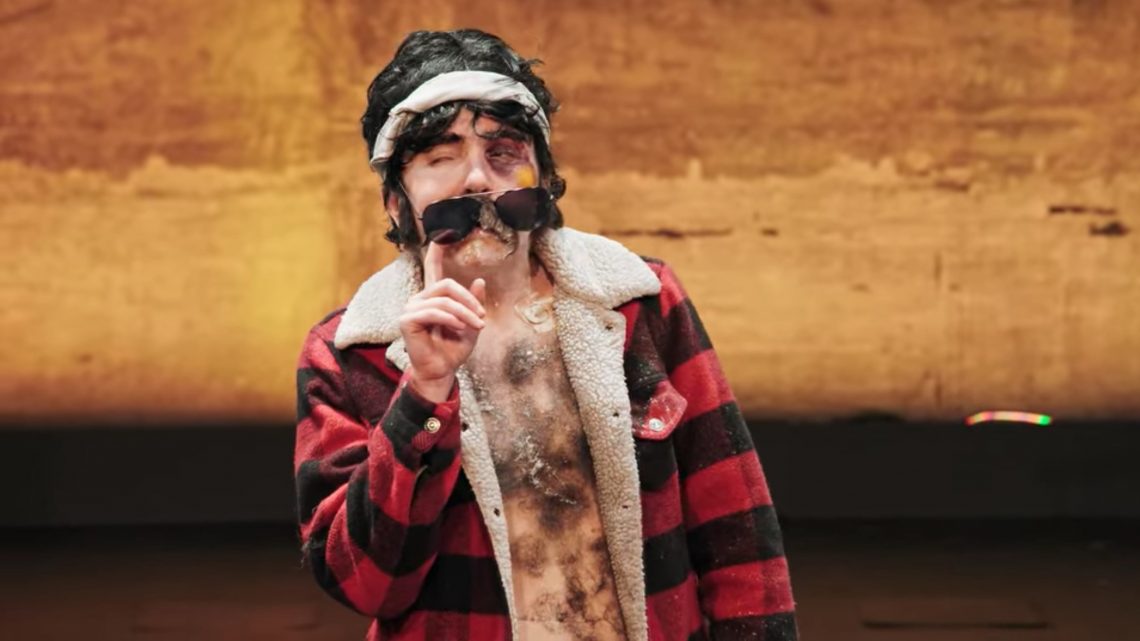
Natalie Palamides Has the Weirdest Comedy Special on Netflix
December 4, 2020When it comes to comedy specials that include a mini dirt bike, LaCroix chugging, and a giant rubber penis, there is only one special—on Netflix, at least—that can check all these boxes: Nate, performed by Natalie Palamides. It feels like a cop-out to say this performance must be seen, not read about, but Ira Glass also said it was "hard to describe," and he's been describing things for a living for decades.
There is quite a bit of audience participation in the show, and because of the unpolished nature of their performances, it's difficult to believe it was scripted. But people have asked as much to Palamides, and she takes offense at the suggestion.
"I'm not going to use a frickin' plant," she told VICE. "How lame is that? That makes the show so lame if I had planned that. That takes all the fun out of it. "
In her show, Palamides creates and then dives into uncomfortable moments. She points to comedians such as Andy Kaufman and Amy Sedaris as inspirations, as well as Mike Myers and Molly Shannon, for their character work.
Critics across the globe praised Nate (and also said it was hard to describe the show,) which Palamides performed at both the Edinburgh and Dublin Fringe Festivals, New York, London, and Los Angeles.
The character Nate is like a perverted Mario brother, who the audience will first despise, but throughout the course of the show, come to empathize with, at least a little bit. There is nudity, a fake penis, real nipples, squeamish audience participation, and that is just what can be shared without spoiling the show.
Directed by Philip Burgers, a professional clown and teacher, Nate is not a typical comedy special, and it's most definitely not like the last or next comedy special you'll see on Netflix. It's puzzling it's on there in the first place, but Natalie Palamides can explain how that happened in conversation with VICE.
VICE: How did this show end up on Netflix?
Natalie Palamides: Yeah, It's been a bit of a journey. You know, I made the show at the Lyric Hyperion in Los Angeles and then took it to the Edinburgh Fringe, and toured it around a little bit, took it to different festivals like Dublin Fringe, and London. At Edinburgh Fringe, the producer of the Netflix special—Kim Lessing from Paper Kite—she saw it there. She got me in for a meeting, and Amy [Poehler] was like, 'We want to make it special.' And I was like "Awesome." So Comedy Dynamics put forth the money to produce it. Big thanks to them for taking a chance on making it, because my nipples are out the whole time and there's a realistic looking prop dick, rubber penis, whatever you want to call it. They were concerned that it was too real and that nobody would want to buy it. At first, I was asked if I could make the dick maybe neon pink. Or cover up my nipples with fake nipples that weren't skin colored and that that conversation got vetoed to pretty quickly. It just wouldn't be the same. Even my parents said, "Why couldn't you wear a skin tight top with nipples on it?" What's the point? Dudes don't have to cover up their nipples. They do have to cover up their wieners. But anyways. Not a real wiener.
That's an interesting point. If you put on the appearance that you are topless, but it's just different nipples, it makes you wonder what's the point if you're seeing nipples, whether they're fake or not.
Nipples on top of other nipples? What's the difference? It still looks like nipples. Anyways, you know, there's Instagrams that point to this. Close up shots of nipples. But they don't censor them because they can't tell if they're male or female nipples because it just so close up, have you seen it?
No, I don't think so. Do you know what it's called? I have no idea what it's called. But I'm sure if you look up "Instagram of nipples."
Yeah, you've given me enough to find it. How many times have you performed this show?
As a completed show, 100 times, probably. Which really isn't even a lot compared to people who do Broadway and stuff like that. But it feels like a lot when you come from doing one-off sets.
When I've spoken to comedians who have been running an hour of stand up, they talk about how they kind of leave their body because they're so dialed into the material. This is obviously different, where there's cues from the audience you have to respond to.
I can't really be on autopilot. The show does get in your body, like the structure of the show, and you remember, Oh, this gag comes next. And maybe just the muscle memory of it becomes sort of automatic going through each piece, but you still have to stay present with what I'm doing, because I'm interacting a lot with the audience and just trying to connect with them and sense what they're feeling and slightly changing based on what I'm getting.
It's funny how it's edited. There are cuts to audience members who are clearly horrified, maybe laughing out of the discomfort of what's happening. Were there times you had audience members who were not as up to play as the audience members in the special?
Even the Lucas that is in the special, he was very reserved. A lot of people sometimes, with the handshake part will add a bunch of ingredients on the sandwich. Some people might come up, they don't want to wrestle me. So I just ended up using my stage combat skills and make it look like they're wrestling me when they're standing there holding my arm. If somebody is really resistant, I change people. I have little litmus tests I use to gauge if somebody's going to play, but sometimes those fail. And I bring up somebody who's fun to play with. For example, when I call out for somebody to play Lucas, I'm like "hey Lucas, hey Lucas" And then I allow somebody there to just volunteer themselves.
I felt really anxious for him [the audience member playing a character named Lucas] for some reason, and his willingness to respond to you was just very stressful.
It's funny because especially when I'm in the shower, I'm not looking at anybody in particular, because the audience is dark right after the shower scene. I'm just looking out into this dark abyss saying, hey, Lucas, and people think I'm looking right at them. And the guy who was Lucas, I talked to him after and he was like [nervously] "I thought you were looking at me, I thought I had an answer. I messed it up!" [laughs] He did great. And it's just funny he felt the pressure, like I had picked him. "I didn't know what to do. You picked me." And I was like, "Actually, you volunteered yourself, but that's fine." The pressure of thinking that you're picked on plays into it.
What appeals to you in the comedy that you're making?
I don't think about it so much. I do whatever comes naturally, but I guess in terms of what I'm trying to make, I have fun being idiots—like high-status. People who think they're great but actually suck. I like playing with that dynamic of thinking that you're awesome and always failing. People that are really dumb but think that they're smart.
They say the clown is that student in class that always raises his hand, but is always getting the answer wrong, but he'll never stop raising his hand. I like playing forever optimists, forever failures. I think it's fun to do something that seems challenging and failing at it and acting like it's a success. I like playing dumb, being dumb, doing dumb stuff. Being stupid and silly. I enjoy being raunchy, too. I like playing with the audience. I like playing with my friends. I just like being absurd, I guess.
What year was the Nate character created?
I actually created him in 2012. I was devising a play with the Pig Iron Theatre Company. And the show was exploring the use of drag in theater. And so we were just generating a ton of drag characters. I was doing a ton of male characters. And Nate was one that just popped up.
And the first thing you did with Nate, he doesn't speak at all right? He's just watching TV and burping?
Just silent and yeah, just burping. Wow, you did your research.
That's something I find so funny because before a phone call, I'm careful about even drinking seltzer because I don't want to burp.
It's just funny. Nate can burp. Even if I was playing a character who was supposed to be really put together, if they burped, it would be a great mistake. Capitalize on your mistakes. All mistakes are kind of where the gold is. You can't really write mistakes. The burps are the gold.
Have you gotten any feedback back from LaCroix or Lyft or Uber?
Nobody's really reached out to me. I haven't been very diligent about going through my social media right now. But no. Come on, LaCroix. I'm repping them really hard in this, so they owe me one. I'm just kidding. Nobody's reached out. But do you think it's a negative for them?
I don't think so. In the universe of Nate, he seems to be supporting both. But I just know how corporate communications people are.
I was surprised that I was allowed to use it because before we shot it, the people doing all the legal work were like, really adamant about not being allowed to use "Bad to the Bone." I usually ride out to this really bad karaoke version of "Bad to the Bone" at the top of the show, and we had a composer who was trying to make a song that wasn't "Bad to the Bone" but had the same feel. And the copyright guy just shut it down every time. I was just really surprised that Uber Lyft and LaCroix [French pronunciation] or LaCroix [American pronunciation] were allowed.
Given the age of this Nate character from 2012, there's probably points where it seemed to be more of a reaction to the news, like when the Louis C.K. story broke [in 2017.]
During the workshopping phase, I was playing around with some Louis and Harvey themed material. It didn't make it into the show. Some of the stuff I tried was pretty on the nose. I would just invite an audience member up to my "hotel room" and have them read a scene, and I started jerking off. I had this box of Tic Tacs, like orange flavored Tic Tac. And I would pass out drinks to people and then pour Tic Tacs in their drink. Nobody liked that. I thought it was maybe a funny visual gag, using Tic Tacs. But people were not on board for that. So I had to tune in to what they were telling me.
You really are into the absurdity, but there are some over messages in the show as well. How do you think about balancing the two, where there are some messages but it's not a PSA?
I really don't like preachy comedy. Preaching isn't a good way to get people to open their minds and engage with ideas that they are guarded against anyways. You have to ask people questions. You have to lay seeds, you can't just give them the full pumpkin. That's a really bad metaphor. I mean, I'm more interested in people engaging in conversations about what they think; I don't really care to tell people what I think.
Doing a show with a message, but also making sure there's comedy in there, they go hand in hand. I think it's the only way to get people to engage with new ideas. Not the only way, but a good way to get people to engage with new ideas is through this lens of laughter. When people are laughing at something, they're not feeling attacked or challenged. And so I think it's a great way to access this opening in the mind. It's a fine line to walk. But I have an aversion myself to being preachy. So I hope the show doesn't come across that way.
This interview has been edited and condensed for clarity.
"Nate" is streaming now on Netflix.


